Blog/Marketing Automation/Social CRM (sCRM) for B2B vs B2C in China: What Brands Need to Know
In this article, you will learn how distinctly different Marketing Automation and Social CRM for WeChat for B2B vs B2C in China can be, from obvious factors like the number of leads and deal sizes to less known ones like engagement purposes and methods.
With over 1.2 billion monthly active users (1), WeChat is a key touchpoint for both B2B and B2C companies to leverage to directly engage with their audience in China. Though you might be aware of the importance of employing Social CRM (sCRM) strategies and tools for WeChat marketing, the process and end goal can be very different for B2B vs B2C businesses.
Read on to learn how exactly your business should approach and utilize Social CRM tools in China and how our digital transformation consultancy IT Consultis (ITC) can help ease you into the practice.
Table of contents
Number of Leads & Deal Sizes
First, the biggest difference of all between B2B and B2C businesses is the number of leads they have, as well as the size of each deal.
For B2C, the customers' needs tend to revolve around a single individual or small group of people. For example, a single shirt, a pair of shoes, or a griller for the family. They are rather straightforward and simple to satisfy. This means the costs of B2C products and services are much lower and there is a much bigger demand for them.
Therefore, B2C businesses have a significantly higher volume of leads that need support at a time.
Here, Marketing Automation and Social CRM (sCRM) tools for WeChat can come into play to streamline the collecting, tracking, and processing of massive quantities of data.
In addition, sCRM for B2C companies also needs to have deeper functionality for automating contact management of these tens of thousands of individuals. This includes developing a holistic tagging strategy and pushing personalized messages and content to embark them onto a well-aligned user journey based on their behaviors and drive them to conversion.
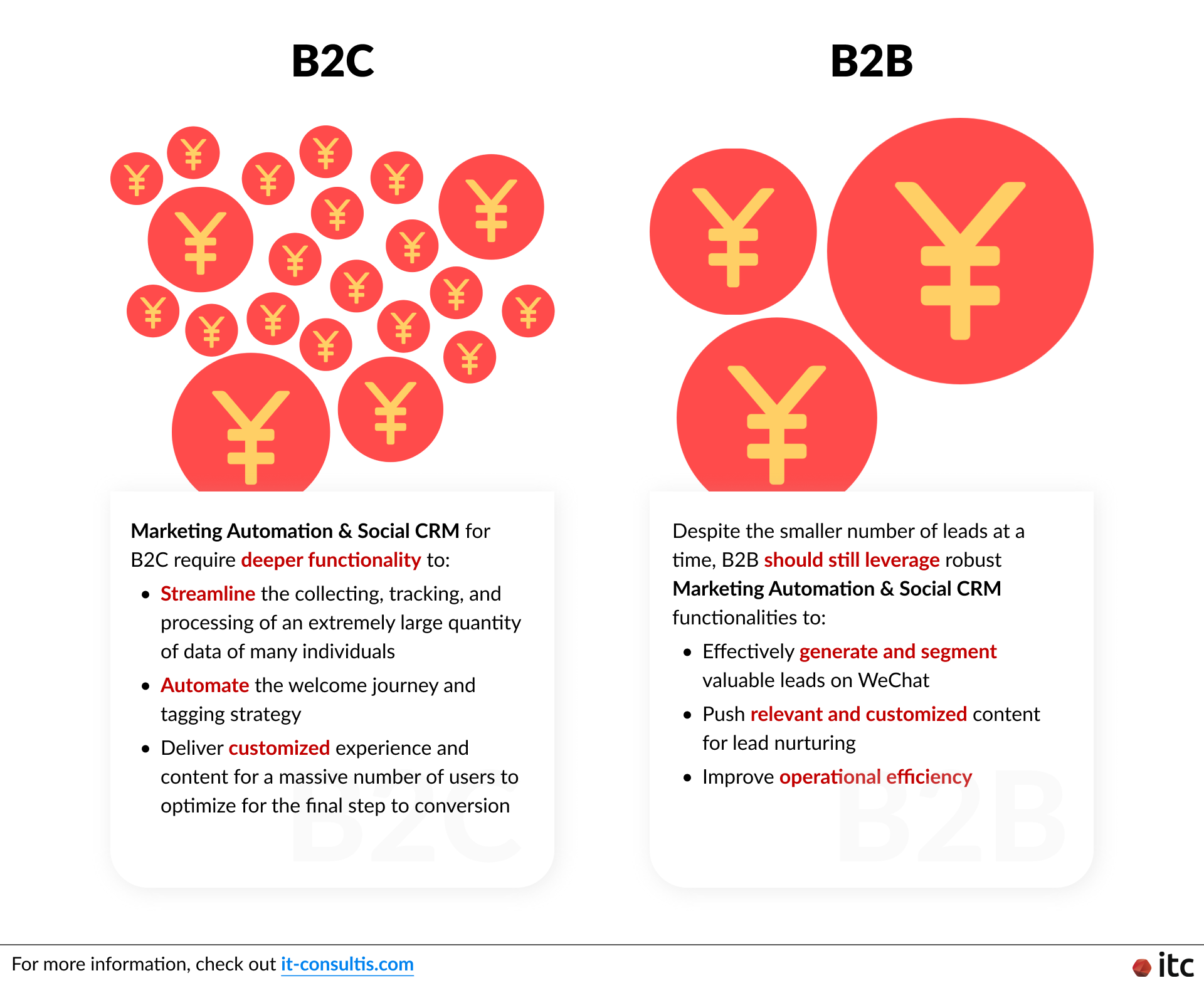
On the other hand, due to the complex nature of their business model, B2B companies have a much smaller number of leads that they need to handle at a time, but with much larger returns.
Thus, while building a tagging strategy and personalizing the welcome messages and content pushes with Social CRM for WeChat are also extremely helpful, contacts with clients on WeChat for B2B businesses can be easier to oversee, possibly even on a case-by-case level.
Another point to remember is that it is not unusual for businesses to also sell to B2B clients in addition to their B2C customers. Since the Official Account is the official hub for brands to directly engage with users on WeChat, this can be a valuable point of contact with their B2B targets as well.
Therefore, it is even more necessary for them to leverage Marketing Automation and Social CRM (sCRM) with WeChat to expertly target and retarget different segments while improving internal operational efficiency.
For example, Technogym, a leading fitness equipment manufacturer, consulted ITC to build a Social CRM strategy in China to engage with both its B2B and B2C clients.
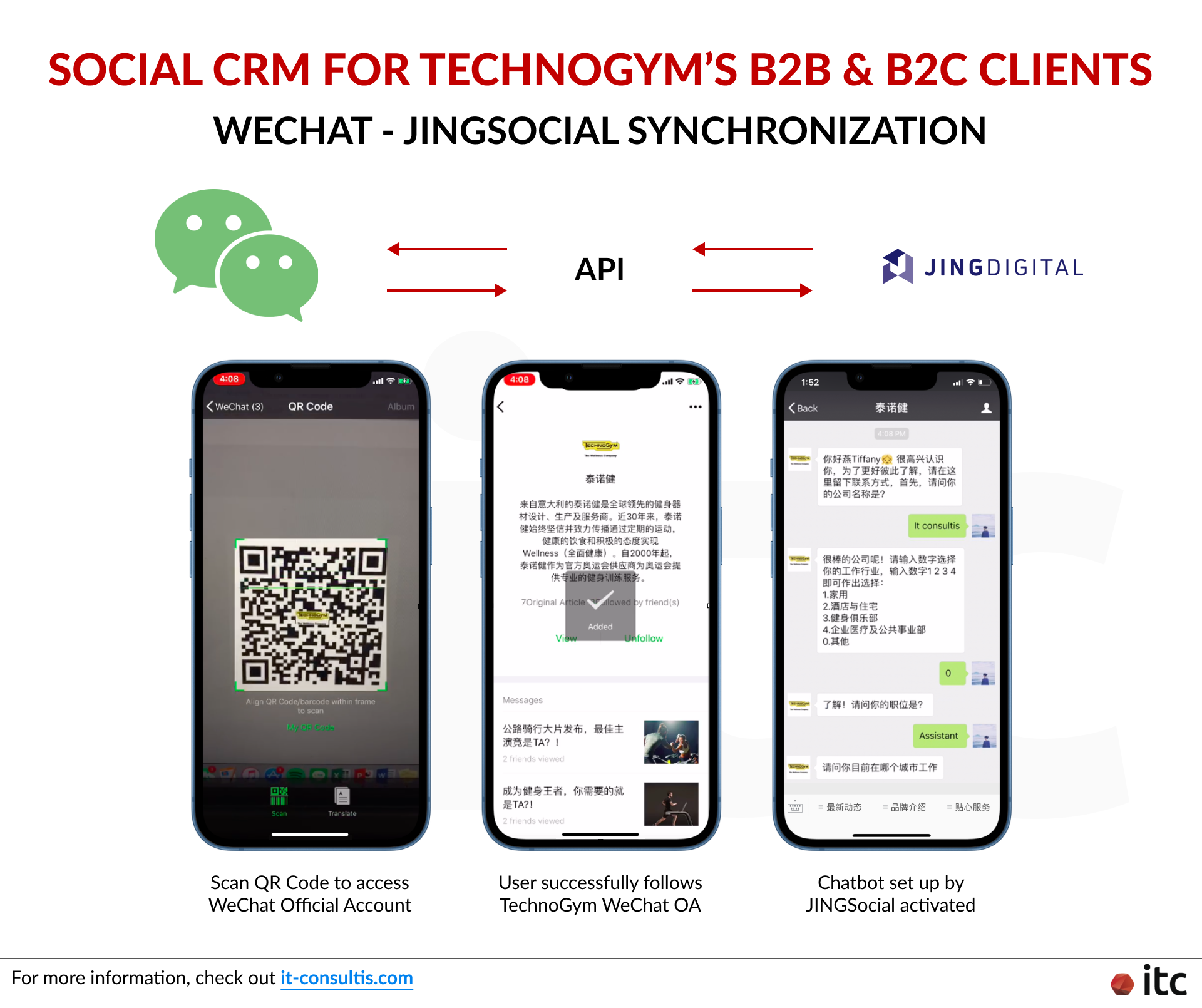
We helped the brand connect the chat window in WeChat Official Account with Marketing Automation tools via API. Next, our expert Social CRM (sCRM) consultants developed a suitable tagging system and created dedicated welcome journeys for each of its target segments, including:
- B2B customers (i.e. fitness center owners)
- B2C customers (i.e. trainers)
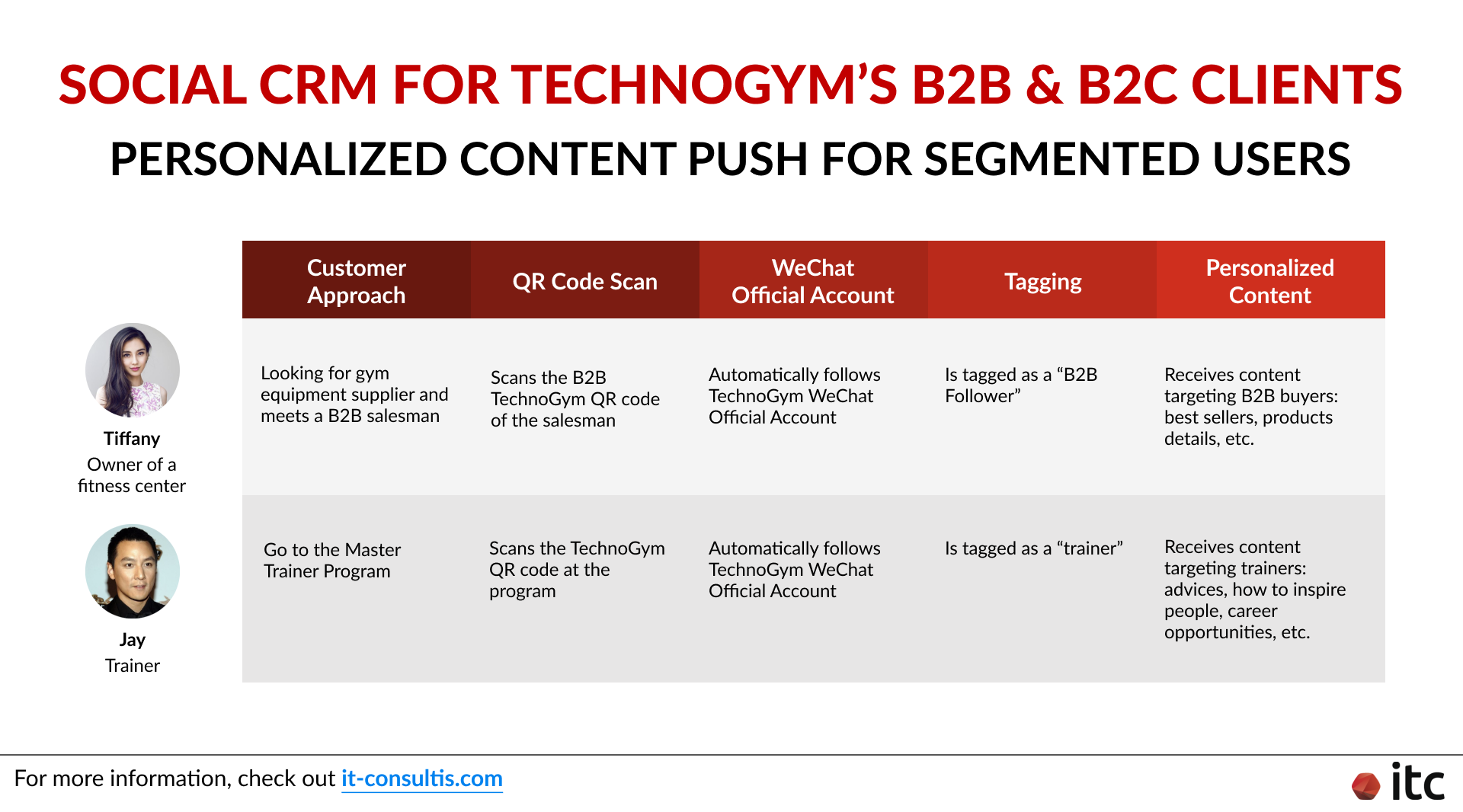
As a result, Technogym witnessed exponential growth in engagement on WeChat from both target groups.
Customer Life Cycle & Buying Journey
As mentioned earlier, due to the nature of their business model with a smaller number of leads but larger deal sizes, B2B sales cycles are much lengthier. They can last anywhere from over a month up to a whole year.
Additionally, the sales process with B2B clients involves more stakeholders in the decision-making process. According to Gartner research, a typical B2B buying journey can involve from 6 to 10 different decision makers. And each of them may independently gather their own information to discuss with each other and reach a conclusion.
Another reason why the B2B life cycle is so much longer is because of how complex and difficult it is to satisfy them and reach a conversion. The same Gartner research reported that there can be 6 different questions B2B clients consider "simultaneously" rather than sequentially:
- What problems do we have?
- What can we leverage to solve our problems?
- What do we need from the solution?
- Does this solution have what we need?
- Are we sure this is the right solution?
- How do we get everyone on board?
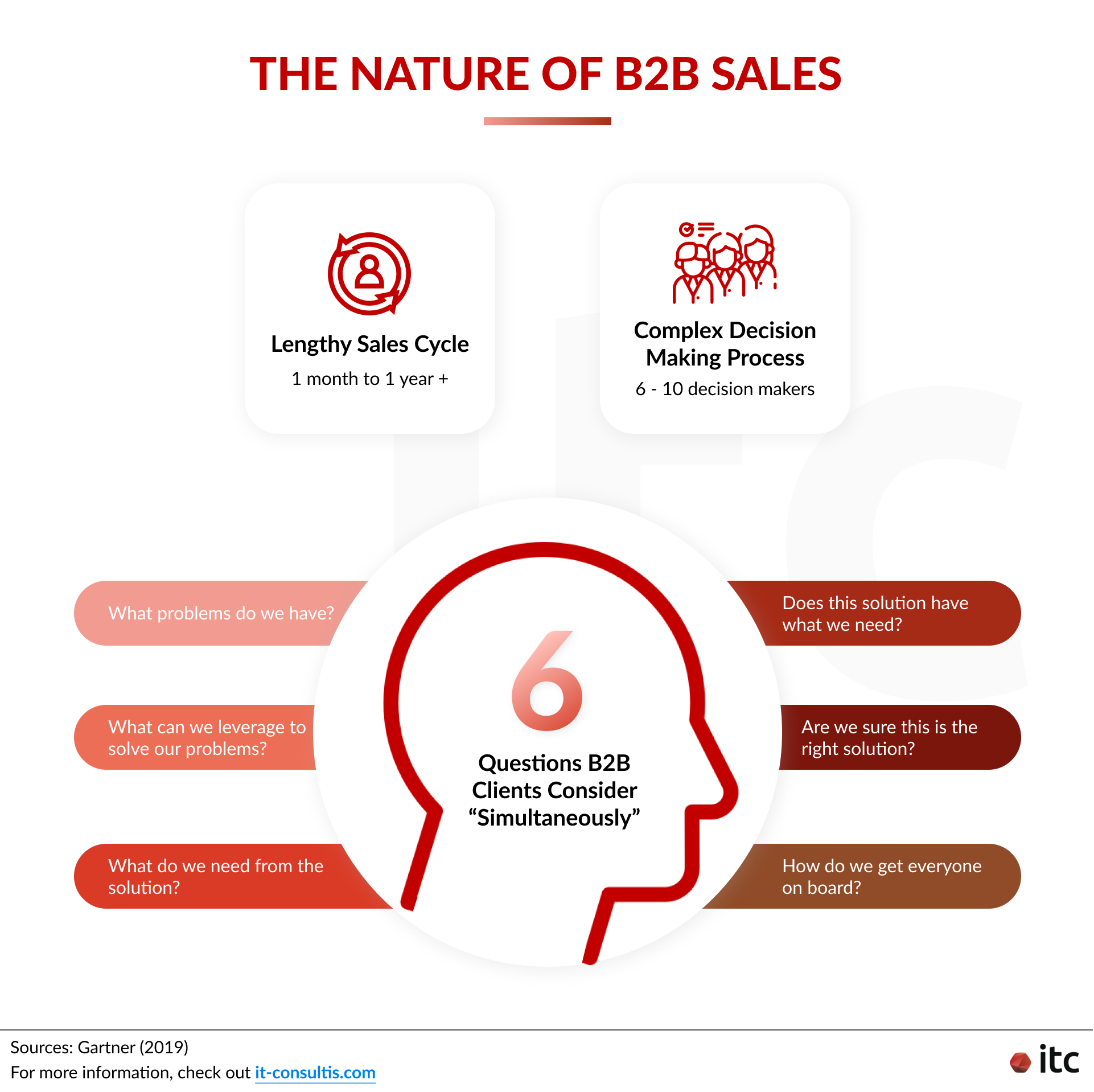
Therefore, the buying journey is not linear or straightforward. Nevertheless, if they can receive useful information from the solution supplier, they are 3 times more likely to make a high-value deal with less regret!
Hence, B2B brands can leverage Social CRM for WeChat to push quality content, stay engaged, and track progress. Ultimately, it is a valuable hub for building authority, reputation, and trust throughout the lengthy life cycle, which is a critical component in B2B sales.
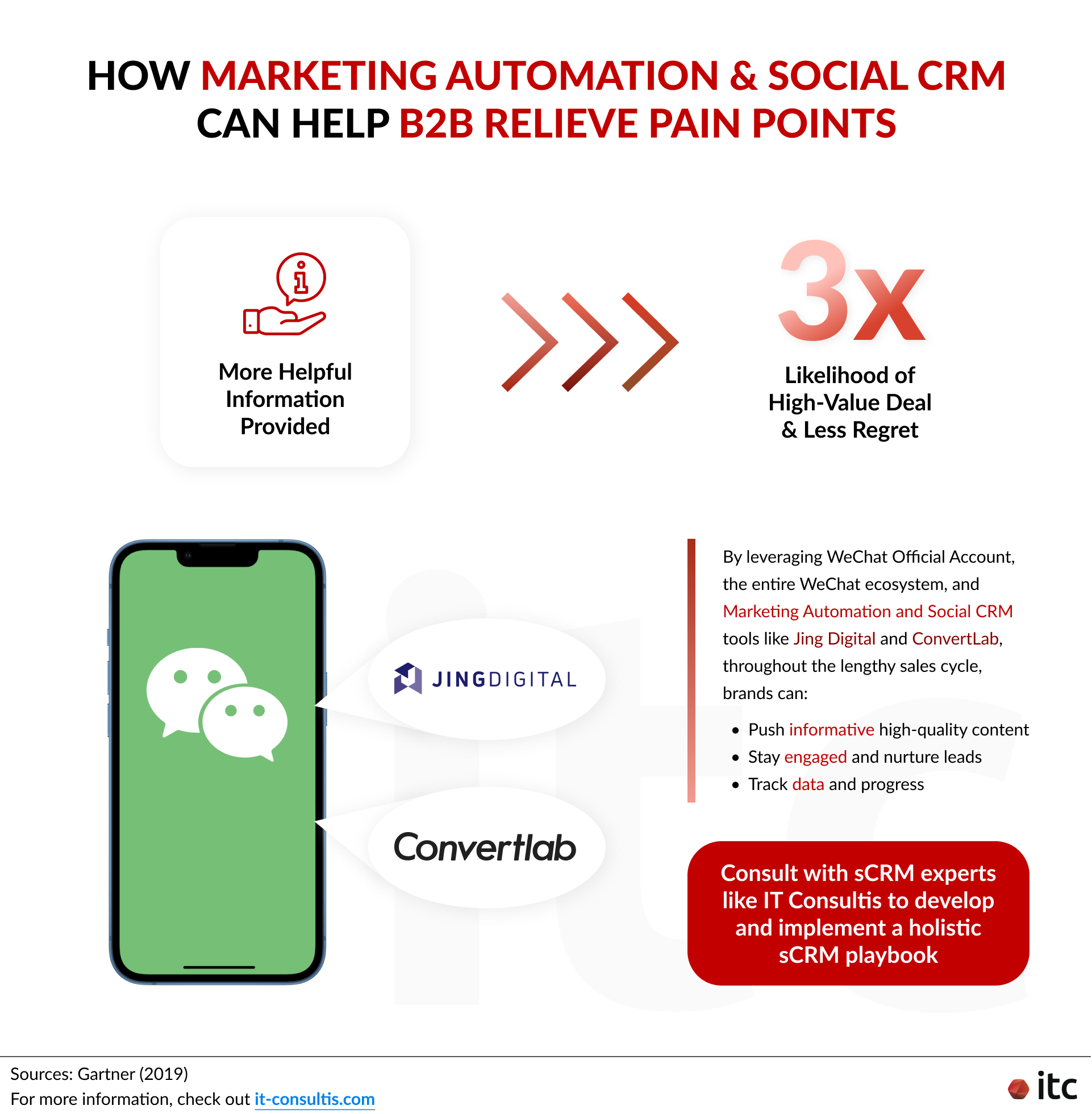
B2C conversions, on the other hand, can happen as quickly as just a few minutes from the product discovery stage. Especially within the WeChat ecosystem, users can:
- Receive customized content push from the brand's Official Account
- Become interested
- Navigate to the brand's WeChat Mini Program
- Browse product details
- Make a purchase with WeChat Pay
There is also a much clearer customer life cycle from raising awareness to facilitating engagement to trigger desires and actions, and finally, conversions.
As a result, B2C brands can develop a very straightforward Marketing Automation roadmap and clear user journeys that appropriately drives the user from the entry point to the final conversion with an established loyalty loop for encouraging repeated engagement and purchases.
However, even with a clearer life cycle, it is still very difficult to build a holistic strategic playbook and follow through without expert knowledge. From account registration, menu setup, and sCRM system configuration to defining tagging and user journey and execution, consult with experienced sCRM specialists at ITC to enable direct data capture, boost engagement, and drive conversions.
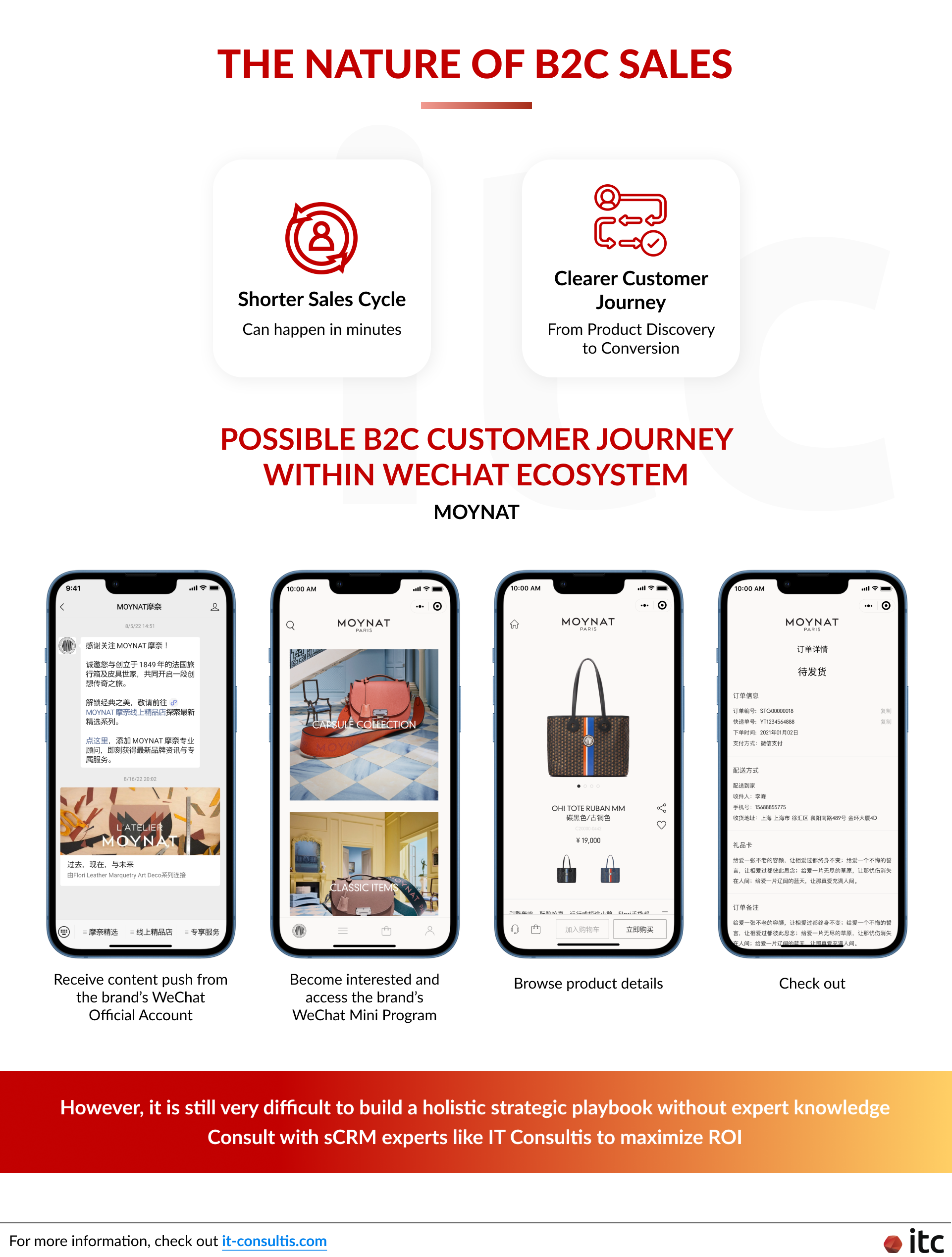
Purpose & Approach
"The most fundamental part of leveraging Social CRM for WeChat is engagement. Brands have to find the right time for engagement to effectively nurture customers and optimize operational efficiency", according to Douglas, ITC's Digital Experiences Manager, China.
While this is true for both business models, the purpose and approach of leveraging WeChat and Marketing Automation and Social CRM tools are very different.
For B2C businesses, as mentioned earlier, conversions can happen very quickly after engagements, and even right on WeChat. Users can easily navigate from the WeChat Official Account (OA) to the brand's Mini Program within the WeChat ecosystem to make the final purchase.
These entry points include the OA's templated message, article, article product card, article advertisement, Mini Program message card, custom menu, and profile.
Therefore, B2C brands can leverage Social CRM (sCRM) for lead nurturing to the point of conversion on WeChat. Particularly, they need to find the "moment of truth", which is "the most optimal time to engage with the target audience based on previously calculated analytics", according to Douglas. This can be every 7 or 14 days and so on.
Thanks to Marketing Automation, brands can enjoy direct data capture and consolidation functionalities for holistic tracking and analyzing to identify the "moment of truth". From here, together with sCRM experts like ITC, brands can clearly define:
- The tagging strategy
- The user journey
- The menu structure
- The QR code placement
- The welcome journey
- The scoring system
- The segmented post
- The personalized menu
Certainly, strategy implementation will not be fixed. There will be ongoing A/B testing for content pushing for up to a year. And, based on the collected data, our sCRM experts can help brands make appropriate adjustments to improve the accuracy of the "moment of truth" for their targets and enhance the Marketing Automation process.
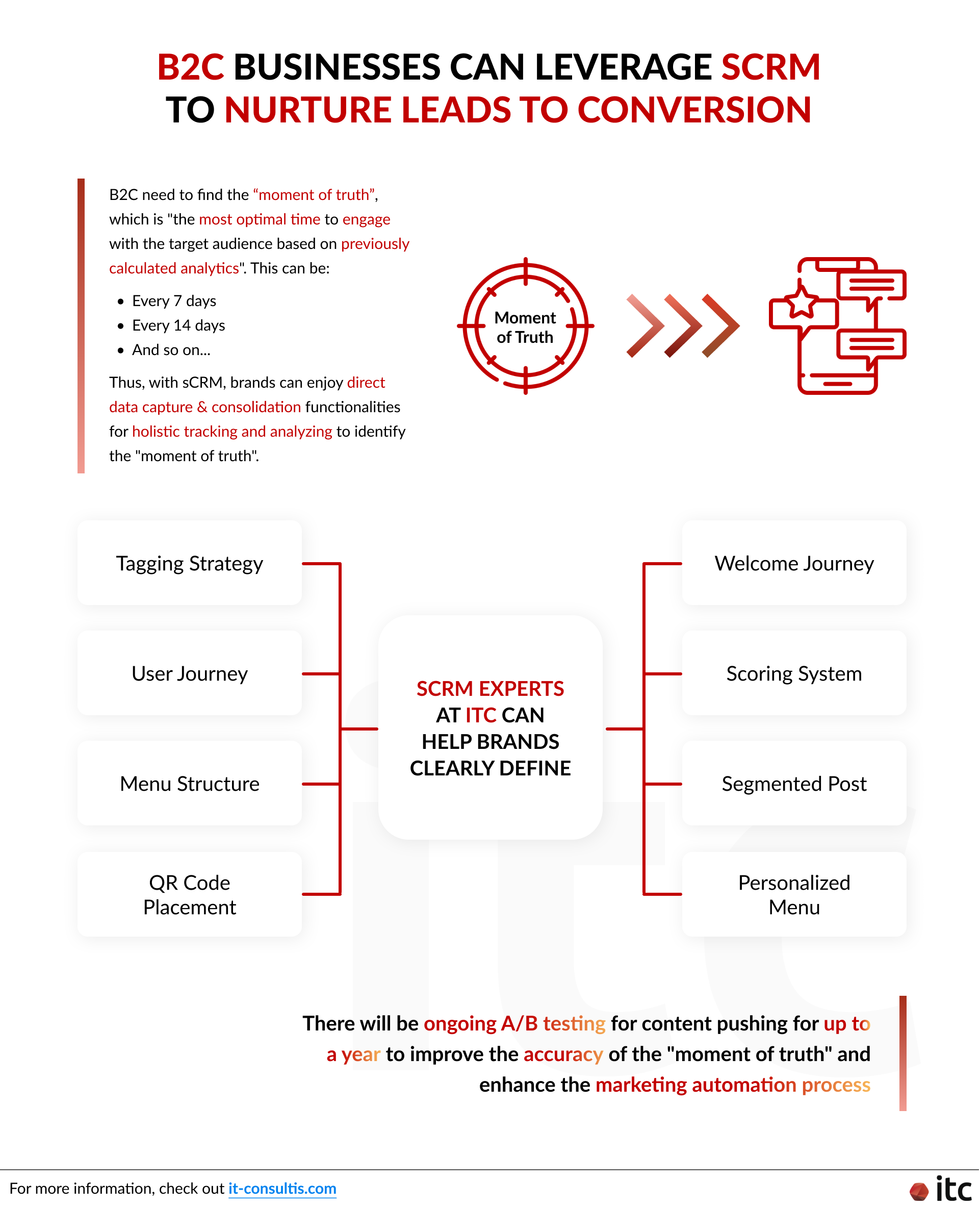
In contrast, for B2Bs, WeChat is less likely regarded as the place of conversion. Instead, brands had better leverage it as an entrance point for welcoming targets, providing information, and raising brand awareness.
This is because, as previously stated, the buying journey is very complex. The key to conversion is identifying and getting through to the key decision-makers.
According to Wunderman Thompson Commerce's B2B Future Shopper Report 2021, more traditional sales channels such as direct transactions with sales reps are still very important. Nearly 60% of Chinese B2B firms would still expect purchases to take place here, compared to the UK's 18% and the US's 29%.
The more complicated and customized the deal is, the more emphasis they place on being able to have face-to-face meetings and personal and productive discussions with sales reps before proceeding.
Therefore, B2B companies had better leverage WeChat and Social CRM in China for promotion and lead nurturing rather than focusing on the final conversion, with fewer interruptions than B2C.
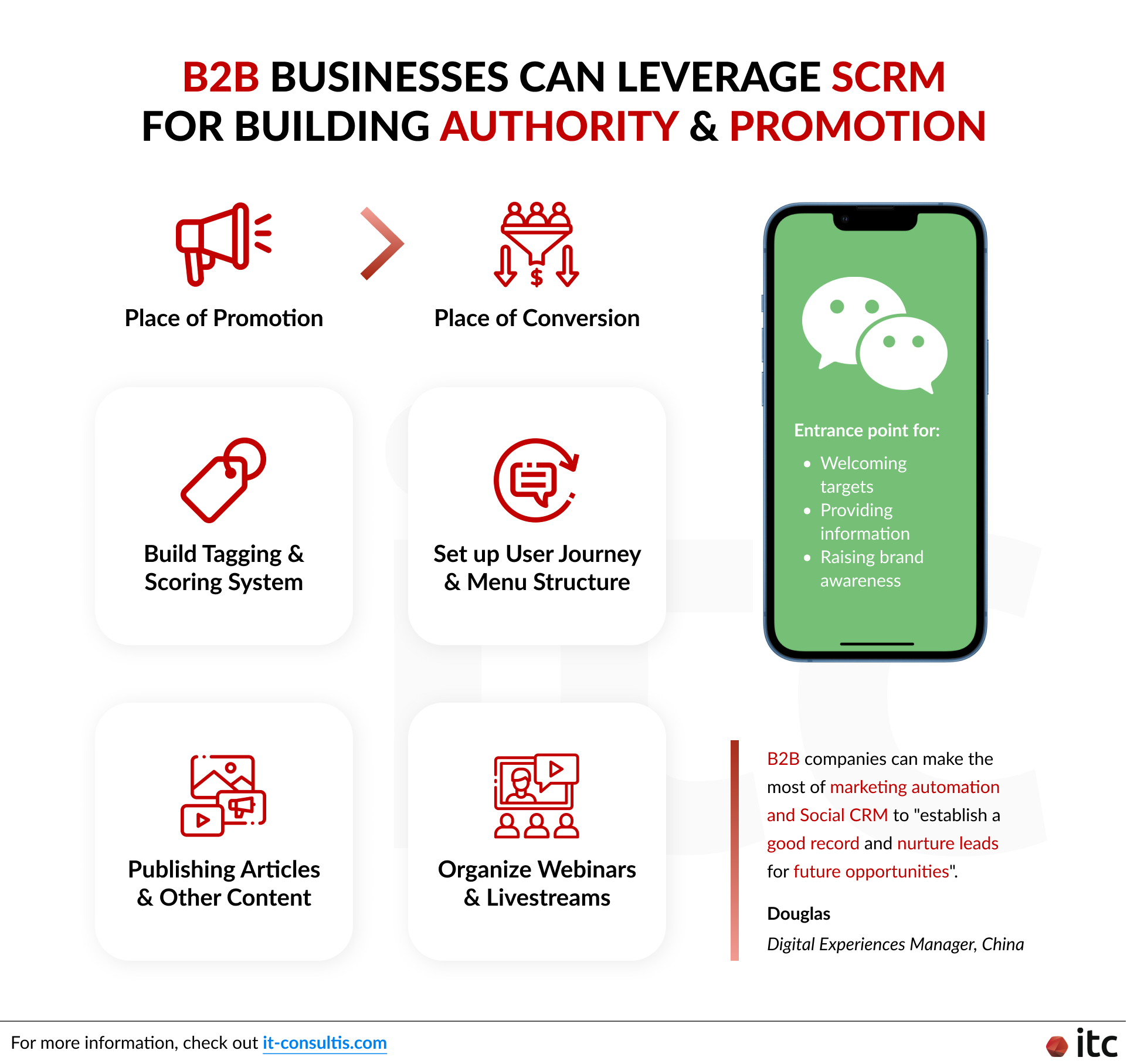
By setting up automatic responses, pushing relevant content on the WeChat OA, live streams, and webinars, and even setting up group chats and enabling direct discussions with sales reps via WeCom, brands can correctly position themselves and their products and services to high-quality leads, attract followers, and collect valuable data.
Subsequently, they can also utilize the tagging and scoring system from sCRM tools to automate the lead scoring process, segmenting users from marketing-qualified leads to sales-qualified leads. From here, more direct interactions on other channels (i.e. emails, meetings, phone calls, etc.) can take over to move the sales process along.
To sum up, B2B companies can make the most of Marketing Automation and Social CRM in China to "establish a good record and nurture leads for future opportunities", which may not necessarily convert on WeChat.
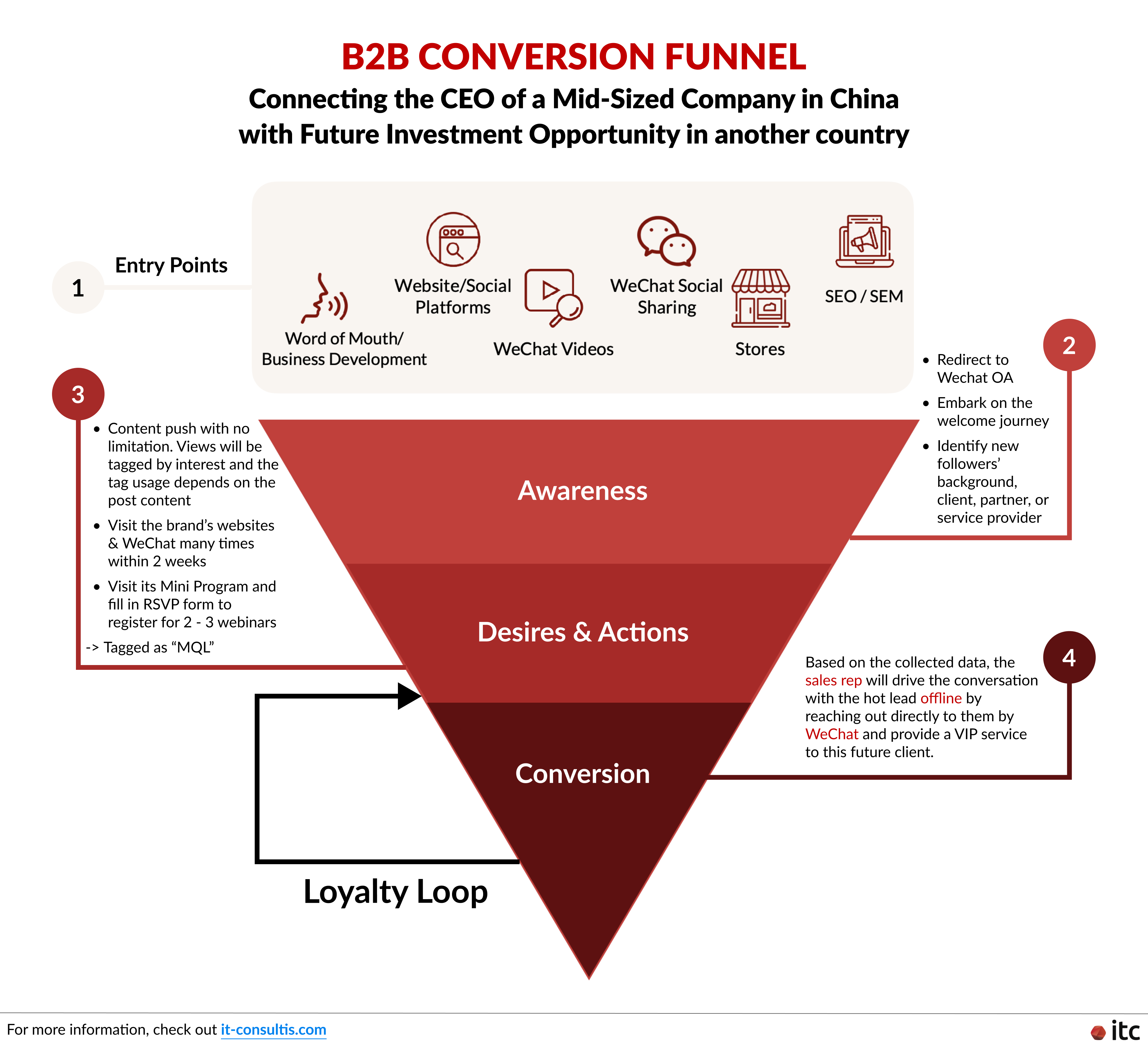
Data Acquisition & Buyer Persona
Although data acquisition is important for both B2C and B2B, which Marketing Automation can offer tremendous help with, it is much more critical for B2C businesses.
As many FMCG brands work with third-party distributors (B2B2C) who then sell to consumers, they do not have a lot of information on the end users. For example, beverage products have to go through several levels of distributors before reaching the final buyers.
Therefore, Social CRM for Private Traffic channels like WeChat gives brands a direct contact window with users to collect data and build relevant segmented buyer personas. By exporting the lookalikes of the potential audience, brands can leverage them for their future targeting strategies on both WeChat and other channels.
Social Fission Marketing
Social fission marketing can be very helpful for brands to attract new users to follow, submit a form, read a piece of content, or scan a QR code on social media platforms, especially WeChat. By providing incentives for joining and sharing, brands can turn users into participants, and finally, sponsors themselves to spread the word to their circle of friends.
With Marketing Automation and sCRM on WeChat, businesses can easily implement and track these social fission campaigns.
However, B2C brands tend to prioritize sharing and virality much more. Their goal is to spread the word to as many users as possible. On the other hand, it is better for B2B to get the words to the right audience, the hot leads who are really interested in reading their white papers.
Thus, the approach that each business may take when it comes to Marketing Automation for social fission certainly differs as well, if B2B businesses ever decide to employ them.
To Wrap Up - Social CRM for B2B vs B2C
Marketing Automation and Social CRM (sCRM) tools are both necessary for B2B and B2C businesses to leverage to boost engagement and conversions when navigating the e-Commerce market in China. However, the detailed approach would differ to match the nature of each business model.
Sources:
(1) Statista (2022)





